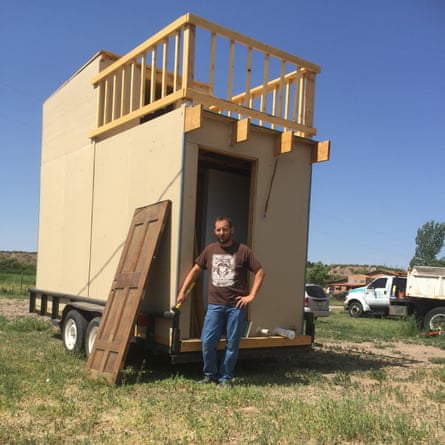Can a person lead a full life with only half their brain? In the 1980s, Ben Carson believed they could. Long before he became head of the federal housing agency, and thus a de facto homelessness czar, Carson was a pediatric neurosurgeon at Johns Hopkins in Baltimore and helped popularize the hemispherectomy, a radical treatment for intractable epilepsy. It involved excising an entire hemisphere of the brain; surprisingly, many of his patients prospered after.
Carson has been in the news this month after testifying before Congress over cuts of almost 15% to his agency’s budget. He has never run a major government department before, and amid anger from homelessness advocates over his defense of the cuts and his comment that poverty is largely a “state of mind”, it is easy to forget that he wasn’t always such a lightning rod.
“As soon as I met him I really liked him, and the first thought that came to mind was he doesn’t have a neurosurgeon’s personality,” said Susan Warnick Breslin, formerly a Johns Hopkins nurse. “You know, the God complex.” Warnick Breslin’s husband, Craig, had Von Hippel-Lindau disease, which causes brain tumors. As Carson describes in his autobiography, he performed a particularly delicate surgery on Craig that required him to remove a tumor from his brain stem. It was more or less successful, though Craig later died of his disease.
A longtime friend of Carson’s, Warnick Breslin says she thinks his impoverished upbringing in Detroit and Boston gives him a greater depth of understanding in his new role. And she recalls him speaking about homelessness “only with compassion”. Now he has a chance to do something about it on a national level, for better or worse.
Thoughts or tips? Email me.
Know someone who should subscribe to the newsletter? Send them this way.
What we published
- Out today: our film and story on the largest homeless encampment in Hawaii.
- The homeless Uber drivers who take you home and then bed down in their cars.
- The homelessness crisis you’ve never heard of on Native American reservations.
- What kind of apartment will a full-time minimum wage job get you? It won’t, actually.
- She was a crack addict. He was a rising political star. Then their worlds collided.
- There’s “little research” on how homeless people navigate intimate relationships, an expert says. That was our cue.
- A sex trafficker reveals how homeless kids are exploited in Alaska.
- Also: soaring homelessness in Los Angeles, and Ben Carson’s views on poverty and a homelessness agency Donald Trump wants to eliminate.

Behind the scenes
I’ve heard from dozens of readers since Outside in America launched.
Some of the responses have been somber. Earlier this month I received an email from an American man living in a small city in central China. “I am 61 years old,” he wrote. “A father of four children.” In the US the man worked as a teacher, but after raising his kids, and as a longtime renter, he was just getting by on his salary. He thought lucrative teaching gigs abroad would enable him to sock away enough savings to provide stability when he returned home. “I have nightmares about being homeless,” he wrote.
This week I spoke with Miguel – who asked to use one of his middle names to maintain his privacy – over Skype. He told me he was a high-school dropout, but after marrying and then becoming a single father he realized he needed an education to make a decent living and provide for his kids. He got his GED, and eventually progressed to studying for his master’s degree. But the student debt wrecked his credit, and he found himself in a financial quagmire. He is afraid of being a burden on his kids.
“I work hard,” he told me. “I’m a good man, I’m an honest man. I don’t steal, I don’t lie, I don’t cheat, so I deserve a dignified life. I deserve housing and enough food to live on, a simple life. I’m a simple man. And the way everything is structured in America, nobody gives a damn, I’m just another number. At least here in China I’m respected for my education, I’m respected for my teaching ability. And I can earn a dignified wage, and I can eat.”
But I’ve also heard positive reactions from people: At a council meeting in San Diego recently, one of them read out from Kelly Davis’ story on the city’s homelessness crisis, then distributed copies to members of the council.
Bookmarked
- Kids are living in junkyards in southern California. [Voice of San Diego]
- What happens when a convicted rapist moves into a homeless shelter? [The Denver Post]
- In a letter to the editor, a reader says: “I see myself as a future homeless senior.” [Los Angeles Times]
- The Albuquerque police department reinstates an officer who gained notoriety for his role in the shooting of a homeless man. [Albuquerque Journal]
- A woman is in a nursing home with Alzheimer’s, and her homeless husband seeks a way to be near her. [FOX31 Denver]
- How a conservative – Ronald Reagan’s son, no less – responded to the news of Los Angeles’ soaring numbers of homeless people. [Newsmax]

Last but not least
Can one man end homelessness? If you live in a small community such as Socorro, New Mexico, you might be inspired to try. “We’re just a town struggling, trying to get things going,” resident Jim Burleson told me of the 9,000-person settlement last week.
Burleson, 43, recently took it upon himself to house the six chronically homeless people he knew of in the town. He does not have a background in the field: he used to be a cage-fighting promoter and in the late 2000s faced criminal charges after shooting a man, though he was acquitted. Today, a father of seven, he organizes comic book conventions and works occasionally as a line producer on movies.
On some land Burleson owns, he has built a 96 sq ft tiny home and has invested $6,000 of his own money. He’s hoping to get help from other well-wishers to fund and build the rest. At that point, he said, people “will have a model to take to all the small towns in New Mexico and say, ‘Hey, it didn’t take much to end homelessness in Socorro, here’s how you do it.’”
alastair.gee@theguardian.com
